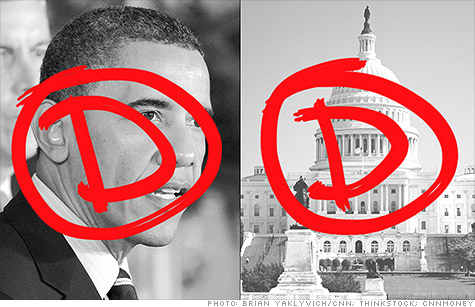Search News

Economists surveyed by CNNMoney gave poor grades to the Obama administration on handling economy, but his critics in Congress fared even worse.
NEW YORK (CNNMoney) -- When it comes to handling the economy, neither Obama nor Congress make the grade.
CNNMoney asked 20 economists to give the Obama administration and the current Congress a letter grade for their performance on the economy. And none of those surveyed gave either one an A.
While both received overall averages of D, Obama did a little better than Congress, scoring three B's and only one F.
Sean Snaith, economics professor at the University of Central Florida, gave the failing grade to Obama, blaming overreach by the administration.
"Pushing too quickly on too many fronts -- heath care reform, financial regulatory reform, the housing crisis, fighting the Great Recession -- all at the same time has resulted in policies that have failed to adequately address any one of these admittedly very difficult problems," he said.
"The uncertainty that came part and parcel of all these changes has in fact undermined the economic recovery and lessened the impact of the economic stimulus," Snaith said.
But if economists were disappointed in the White House, many are far more angry with the partisan gridlock in the current Congress. There, Republican control of the House combined with only a narrow Democratic majority in the Senate has essentially stopped any new economic stimulus and brought the threat of government shutdowns and default by breaking through the debt ceiling.
Several economists said Congress was more interested in scoring political points than in helping the economy.
"Partisan squabbling has not helped the economy," said Russell Price, senior economist with Ameriprise Financial Services, one of five economists to give Congress an F on the economy.
There were 11 others who gave Congress a D, and only one B, from supply-side economist Bob Stein of FT Advisors.
There are many economists worried about the so-called fiscal cliff -- a variety of taxes set to rise early next year, including income tax rates and payroll taxes, just as deep federal spending cuts take effect, unless the two sides in Congress can reach a compromise.
The economists identified the fiscal cliff as the second most serious problem facing the economy right now, just behind the European sovereign debt crisis. The Federal Reserve has warned that just the threat of the cliff is already starting to slow hiring and economic growth.
"Eleventh-hour decisions and kicking the can down the road do not provide certainty to businesses and individuals," said David Crowe, chief economist for the National Association of Home Builders. "As a result, economic decisions will also be postponed or made on the basis of the most conservative expectations without better indication of the future."
Crowe is one of 10 economists to give the same grades to both the Obama administration and Congress. He gave each a grade of D.
"The administration and Congress share the same economic record," said Keith Hembre, chief economist for Nuveen Asset Management in Minneapolis.
But others split the blame, with seven giving Obama a better grade.
"The recession ended within six months of Obama taking office after massive government stimulus," said Bernard Baumohl of the Economic Outlook Group, who gave Obama a B and Congress an F.
"The U.S. banking system is now much healthier; the auto industry survived, is profitable and hiring. The problem is the US economy is being held hostage to a paralytic Congress and the crisis in Europe." ![]()
| Overnight Avg Rate | Latest | Change | Last Week |
|---|---|---|---|
| 30 yr fixed | 3.80% | 3.88% | |
| 15 yr fixed | 3.20% | 3.23% | |
| 5/1 ARM | 3.84% | 3.88% | |
| 30 yr refi | 3.82% | 3.93% | |
| 15 yr refi | 3.20% | 3.23% |
Today's featured rates:
| Latest Report | Next Update |
|---|---|
| Home prices | Aug 28 |
| Consumer confidence | Aug 28 |
| GDP | Aug 29 |
| Manufacturing (ISM) | Sept 4 |
| Jobs | Sept 7 |
| Inflation (CPI) | Sept 14 |
| Retail sales | Sept 14 |